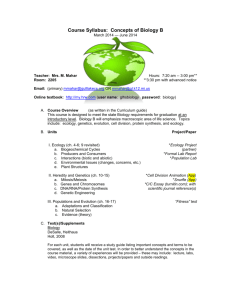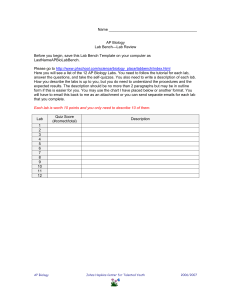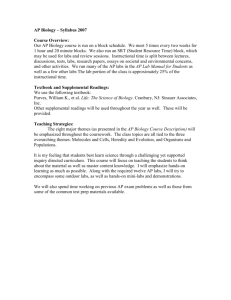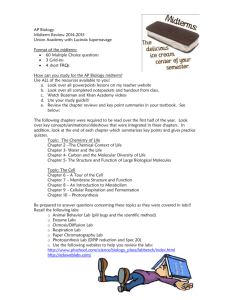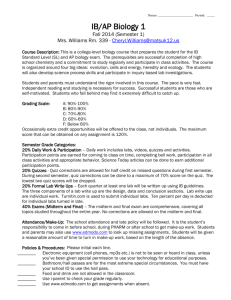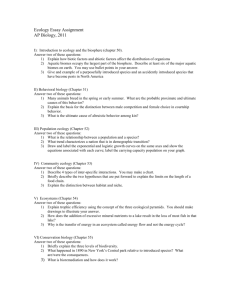ENVIRO lab symposium - ENVIRO Collaboration Wiki
advertisement
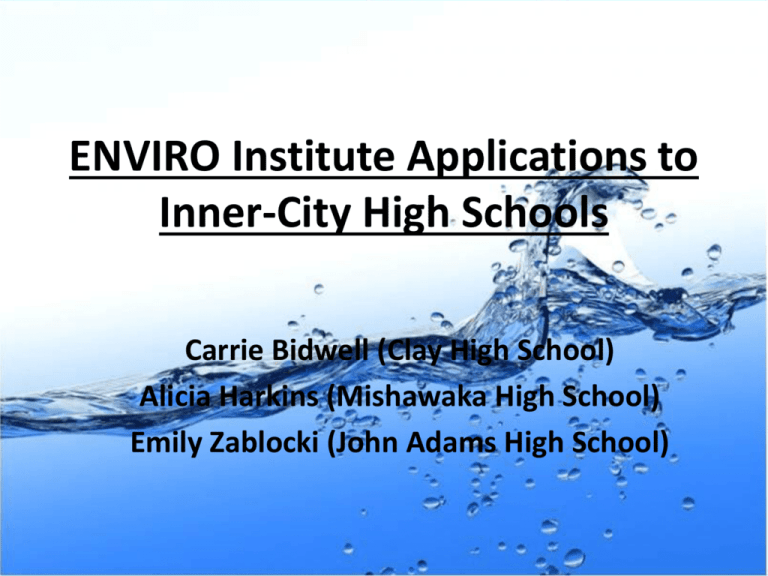
ENVIRO Institute Applications to Inner-City High Schools Carrie Bidwell (Clay High School) Alicia Harkins (Mishawaka High School) Emily Zablocki (John Adams High School) Well Water Testing in the Urban Setting Objectives of Well Water Testing • • • • • • To learn how to use water particle testing strips To learn how to use LabQuest testing probes To learn about water quality To learn proper water particle levels To learn about Well Head Protection Areas To learn about how water is processed in urban areas vs. rural areas • To bring University Level research based science into the high school classroom Summary of Project • Students learn background information about water and well head areas. • Students then will be introduced to water testing methods, including using test strips and LabQuest probes. • Students will learn how to accurately test for nitrates, chlorides, pH, and hardness. • Students will then collect well water samples from the community, which they will test. • Students then will evaluate their own results and compare them to the results of their classmates and also students throughout the area. Integration of Well Water Testing in the Urban Setting • Have students compare water from the same well – This would provide additional validity to testing measurements • Have Notre Dame provide well water samples for the student population – This would expand the area tested and provide further information regarding a larger well head area • Have students compare well water to tap water from homes – This would demonstrate the difference between city treated water and aquifer water • Compare tap water through out the school – This would demonstrate the safety of different more “purified” waters throughout the school and also serve as a prime example of why the students should only drink water from the water fountains which are purified and chilled. Cross Curricular Ideas • Math – Collaborate with Math classes to evaluate and statistically analyze data collected during the experiment • Social Studies – Provide history of water and background information regarding the areas that are being tested • i.e. land development over time • English – Write a paper that incorporates Social Studies history, Biology experiment, and Math calculations, and final conclusions and thoughts Best Fit in High School • While this lab may not meet Biology standards it does have the ability to be transformed to better meet Biology standards – Focus more on how the water gets to the ground from the water cycle in biogeochemical cycles unit. • Earth Science and Ecology classes may better work into the initial design of the experiment – Teachers should pass this information along to these teachers to help expand the project and its relevant applications to science, along with better meeting science standards ND Ecology Labs • How could the resources available from the Notre Dame Ecology labs be utilized by the inner-city high schools? Stinson-Remick Engineering Building • The primary functions of the building: – Provide spaces for undergraduate teaching in the Learning Center • Allows students to see same-age peers in college setting – Graduate and post doctorate research is done in various centers and labs. • Allows students to understand that not all college students involved in science become physicians Includes equipment most students (and teachers) do not realize is available Clean Room TEM SEM Galvin Labs McLachlan Lab Three major projects of this lab: 1. Evolutionary response to rising CO2 and its ecosystem consequences 2. Population shifts in forests 3. Managed Relocation and other climate change adaptation strategies Galvin Labs Tank Lab Major projects of this lab: 1. Salmon in Alaska 2. Stream Ecosystem Ecology & Biogeochemistry 3. DITCH project Galvin Labs Lodge Lab Major projects of this lab: 1. Freshwater Ecology 2. Invasive Species Biology and Bioeconomics 3. Ecological Risk Analysis 4. Global Changes and Biodiversity 5. Environmental Ethics and Policy Benefits of the Galvin Labs • University staff (professors and graduate students) are VERY willing to invite individuals into their labs. • Students that demonstrate an interest in environmental science would have a specific project to be involved in. • Notre Dame had access to equipment not normally found in high schools. Place Based Ecology Education Is it possible in an inner-city school? • The main purpose of "outdoor education" is to provide meaningful contextual experiences-in both natural and constructed environments--that complement and expand classroom instruction, which tends to be dominated by print and electronic media (Knapp, 1996, p. ix). WHY IS PLACE-BASED EDUCATION IMPORTANT? • Some critics of place-based education believe that the primary goal of schooling should be to prepare students to work and function in a highly technological and consumer-oriented society. Will it work for a Urban Classroom? • • • • • • Materials Space Use Liability Motivation (interest) Match of standards Materials • Urban based educators may need to raise money for project • Donation from local agencies • Start a science club? Space • Be creative! What is your goal? • Are you an environmental teacher, biology teacher or elementary? • Raised plant beds? • Corner gardens • Soil testing • Bug (insect) finding • Scavenger hunt • Water quality testing Use? • Create dichotomous key for students identify species of plants or animals – Student generated or teacher generated • Analyze growth patterns of different plants • Analyze soil for nutrients both biotic and abiotic factors Liability (Safety) • Will they run? • Can escape? It is in a safe area? • Can you manage 30+ students at one time to maintain on task behavior? • Could students find something that the school may not want them to find? Motivation (Interest) • Environmental Science is an elective in Indiana High Schools – Not all schools even offer it, or find enough students interested in taking it • Could incorporate into Biology curriculum Standards • Where would it fit? • Environmental • Biological
